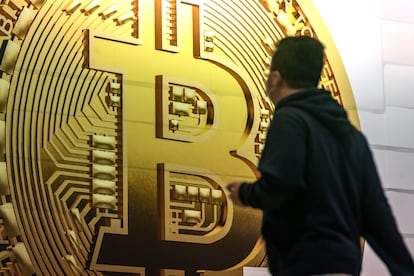The story of a crypto scammer that ended in suicide
Javier Biosca – a digital currency guru who swindled 300 Spanish investors – killed himself after being subjected to harassment by international mafias

On Tuesday, November 22, Javier Biosca jumped from the fifth floor of a hotel in Estepona, Spain. His suicide ended a career as an international broker that was as brief and irregular as the cryptocurrencies he handled.
Biosca leaves behind a wife and son. However, there is no trace of the private plane, mansions or luxury cars that he supposedly accumulated over the course of a few years.
When he was buried this Friday in the resort town of Estepona, only a small group of relatives attended the funeral. In addition to his wife and son, only his mother and a handful of friends showed up.
Given the state of the body, the casket was kept shut.
From March 2019 until the fall of 2020, Biosca was the biggest cryptocurrency scammer in Spain. Throwing around words like “blockchain” and “digital wallet,” he managed to deceive hundreds of clients – including lawyers, notaries, businessmen and dangerous Russian and Romanian mobsters based in Andalusia, in the south of Spain. According to police sources consulted by EL PAÍS, each person he interacted with had lost at least €50,000 ($52,000) in his pyramid scheme.
Biosca was born 50 years ago in Barcelona. He lived there until 2001, when he fell in love with Paloma Gallardo, a hairdresser from the province of Toledo. They set up house together in Torrijos – a town of less than 10,000 residents – where he tried, unsuccessfully, to set up a hardware store. Shortly after, the couple moved to Fuensalida, a nearby town, where Biosca became a freelance website designer. He began investing in bitcoin and perfecting a computer program that allowed him to perform thousands of operations to buy and sell coins simultaneously.
In 2019, Biosca founded the Algorithms Group in London – a firm dedicated to attracting small investors eager to jump on the cryptocurrency bandwagon. A group of 19 friends were the first to fall for his scam. He proposed that they make three types of crypto investments: bitcoin, ethereum and litecoin – the latter two being alternatives to bitcoin, the star cryptocurrency.
Biosca – reportedly an uncharismatic, quiet fellow – presented himself as a digital currency expert, capable of increasing investment between 20% and 25% each week. When his firm began to operate in the summer of 2019, a single bitcoin had a value of about $10,000.
Hand-in-hand with his wife – a woman described as an “ambitious and manipulative person who made Javier do as she liked” by Emilia Ceballos, who represents many of those affected by the scam – Biosca managed to grow the operation. He hired four public relations specialists, who attracted rich clients from all over Spain. In the early months, his employees were paid on time and his clients saw their digital portfolios grow.
But the crypto boom didn’t last forever. Eventually, all three of the digital currencies that Biosca was heavily invested in began to lose value at a rate that was much faster than his ability to amass new customers. A year after the foundation of the Algorithms Group, salaries were starting to get delayed. And then, commissions fell: 15% went down to 10% and then 8%.
By the end of 2020, the Algorithms Group had stopped paying returns to its customers. Around that time, the value of bitcoin had collapsed to around $5,700. The decline would only continue.
In Torrijos – a town centered around a baroque church, with Spanish flags on every balcony – nobody remembers Javier Biosca or has much interest in cryptocurrency. The local economy is still old-fashioned, dependent on livestock and winemaking. The only visible international elements are the Moroccan immigrants who sell goods on the streets and the Swiss café that sells coffee in front of the City Hall. In the hardware store, the employee doesn’t recall any former owner who became a millionaire.
But in the south of Spain, Biosca and his family are better remembered. A few months after starting to earn money, the husband, wife and son moved into a spectacular mansion in Marbella. They paid $15,000 a month in rent, installed four safety deposit boxes and leased several luxury cars. Biosca also threw tremendous parties that were a sensation along the Costa del Sol, hiring a team of bodyguards that included former Spanish and Colombian police officers to protect his rich guests.
In the world of cryptocurrencies, appearance is tremendously important. Biosca even went so far as to inquire about purchasing a bank in Cape Verde and another in Guinea Bissau.
In March 2021, several of Biosca’s clients – realizing that they had been cheated – filed a complaint in court. Judge Santiago Pedraz issued a search-and-arrest warrant against Biosca for fraud, money laundering, forging documents and running a criminal organization.
Spanish police captured him four months later, during a routine traffic stop in the town of Nerja. He spent eight months in jail, until March 2022, when a mysterious guarantor posted a bail of €1 million ($1.04 million).
When he got out of jail, Biosca had lost more than 40 pounds. During his incarceration, he had been badly beaten by other inmates. According to two close friends, the guarantor was actually a group of scammed people. When they realized that he wouldn’t be able to get them their money, they withdrew the bail, and the National Court ordered Biosca’s return to prison.
“He was terrified of the idea of going back to jail, or of being shot in the street,” explains a person close to Biosca. The National Court accused him of an alleged fraud of €815 million ($848 million). Meanwhile, the most dangerous mafias to whom he owed money were already on his trail.
“He lived in anguish that the Russian and Bulgarian gangsters whom he had defrauded would kill him,” explains Ceballos, the attorney who represents the law-abiding individuals who were defrauded by Biosca. “We believe that [the money] is still in the hands of his wife and son. She was the one who handled the codes and had access to the money,” the lawyer insists.
She has also accused Luis Monje – who is under investigation – of being Biosca’s frontman.
Monje, however, claims that he is simply another victim of fraud. He told EL PAÍS by phone from Seville that he only had contact with Biosca because he was trying to recover 1.5 million euros that had been stolen from him in the crypto scam.
“The lawyer for those affected doesn’t mention that she, too, invested €50,000 in cash in bitcoin… the National Court itself has asked her to clarify the origin of the money,” he adds.
The police sources consulted by EL PAÍS confirm that Monje was not in Estepona on the day of Biosca’s death. They do point out, however, that, hours before Biosca’s suicide, Monje met with local criminals. Whether they told him about any threats that the con artist had been receiving remains a mystery… as big a mystery as where all the money went.
Tu suscripción se está usando en otro dispositivo
¿Quieres añadir otro usuario a tu suscripción?
Si continúas leyendo en este dispositivo, no se podrá leer en el otro.
FlechaTu suscripción se está usando en otro dispositivo y solo puedes acceder a EL PAÍS desde un dispositivo a la vez.
Si quieres compartir tu cuenta, cambia tu suscripción a la modalidad Premium, así podrás añadir otro usuario. Cada uno accederá con su propia cuenta de email, lo que os permitirá personalizar vuestra experiencia en EL PAÍS.
¿Tienes una suscripción de empresa? Accede aquí para contratar más cuentas.
En el caso de no saber quién está usando tu cuenta, te recomendamos cambiar tu contraseña aquí.
Si decides continuar compartiendo tu cuenta, este mensaje se mostrará en tu dispositivo y en el de la otra persona que está usando tu cuenta de forma indefinida, afectando a tu experiencia de lectura. Puedes consultar aquí los términos y condiciones de la suscripción digital.









































